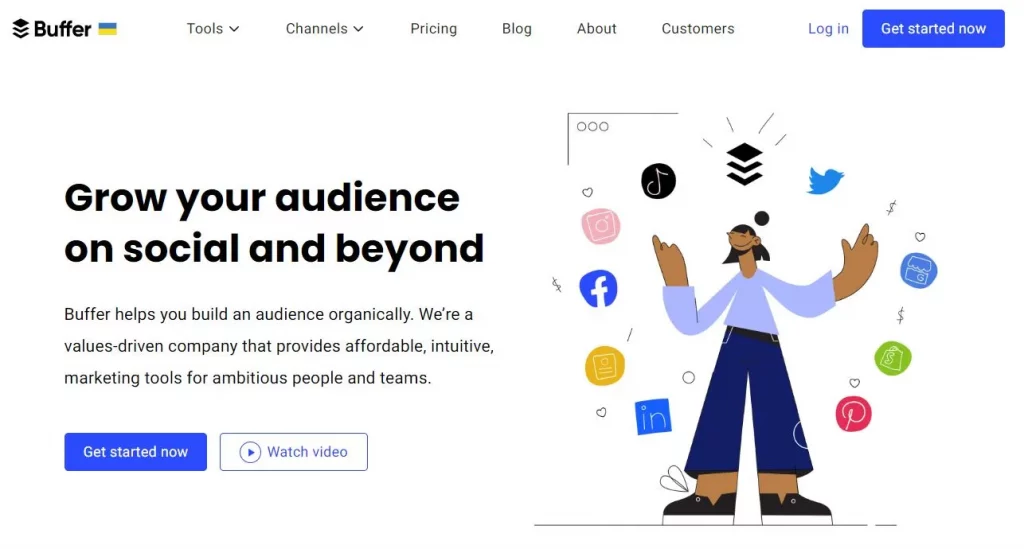It is known that 62% of small business owners work more than 50 hours per week, and more than half of them work six or seven days a week. Consider managing all daily operations, leading teams, planning projects, controlling cash flows, hiring staff, and allocating tasks and resources.
The list goes on and on. While doing this, you are attempting to market your goods and services by speaking with both current and potential clients over the phone and through text messages.
If you want to use cutting-edge technology, you should know what options are available and what their main features are. This will help you choose the solution that best fits your needs.
In this article, we’ve put together a list of ten basic business management tools that can help you run your business more smoothly and get more done. To help you choose the best way to manage your small business, we’ll also talk about the pros and cons of using a mix of separate tools and a unified solution, like Caflou, that combines multiple business management tasks on a single platform.
What is business management software?
You can think of business management software as an app that helps organizations improve their processes by automating the execution of routine tasks and functions.
These tools are made to free business owners and managers from low-value, time-consuming tasks. They improve many parts of how a business works, such as keeping track of time, managing workflows and customer relationships, billing, and reporting.
Why should you invest in management tools for your small business?
Small business owners are increasingly investing in management tools to help them manage their company. These tools can be used for various activities, including managing finances, managing human resources, and marketing.
Here are some benefits of using management tools for your small business:
- Helps you manage day-to-day tasks
- you can track the progress of the business
- They can provide a better customer experience
- You can manage team members
- you can track the progress of the business
- reduce operational costs
- improve employee engagement
- Business software can save your time
- you can improve your business fastly
Why are tools for small businesses important?
Modern solutions can bring your business a number of benefits: Now that you know what the game is called, let’s take a closer look at the key solutions you can easily implement in your business.
Check out this list of five management tools for small businesses.
1. Digital Publishing platform: Flipsnack

All small businesses need a catalog, a brochure, or some other kind of advertising material to show off their products or services. Flipsnack is a cloud-based digital tool that lets any business make digital documents like magazines, catalogs, brochures, flyers, reports, etc., and download them in different formats like PDF, JPEG, PNG, GIF, and HTML5. If you need digital brochures, you can upload a PDF file and use Flipsnack’s Design Studio to make it interactive.
You can also start from scratch and use one of their many customizable design templates. Here are some tips on how to make your own digital brochure that will best represent your business and bring in customers.
Their templates can be used for all kinds of business and event brochures in fields like fashion, health and fitness, school, travel, and marketing.
Flipsnack’s digital brochures are also great for real estate businesses because they can be integrated with the Multiple Listing Service (MLS). This lets realtors use the same template design for each listing and only change the information.
Flipsnack has a free plan, but it’s not very good. It also has three paid plans that are good for small businesses: the starter plan, which costs $14 per month; the professional plan, which costs $35 per month; and the business plan, which costs $79 per month.
2. Social Media Management platform: Buffer

If you own a small business, or really any business, you have to promote it on social media. However, keeping up with posts and messages is a nightmare if you don’t use a tool like Buffer to manage your social media accounts. Buffer is great for people who are just starting out with social media management, and it lets you do a lot of things. All of these can save you a lot of time and tell you a lot about your audience and what they like about your products or services, when you post, and what they find interesting.
Some users complained that the price was too high, that customer service was bad, and that they kept making mistakes and failing to post. If you’re looking for alternatives that might be better for your business, check out this list of social media management tools. Pricing: Buffer has two different sets of services: one for publishing and the other for analytics.
Both the Premium and Business plans, which start at $56 and $85 per month, are good for small businesses when it comes to publishing.
The Premium publishing plan gives 2 users access to 8 social channels, but the Business plan gives 6 users access to 25 social channels. If you want more in-depth analytics, you’ll need to add one of the analytics plans, which starts at $28/month for the Pro plan.
The Premium analytics plan starts at $40 per month and gives you access to analytics for Shopify and Instagram Stories, as well as a few more reporting features.
3. Chat and Collaboration software: Slack
Communication is important in every aspect of life, and that’s definitely true when it comes to running a business. Making sure everyone knows what’s going on and is on the same page is important for everything to go smoothly and to avoid easy-to-avoid miscommunication problems. Because of this, you need an app that lets you all talk to each other.
Skype or WhatsApp are great for one-on-one conversations, but if you have more than two or three people on your team, you might want to try something like Slack. With Slack, you can send messages to one person or to a group. This makes it much easier to talk to people on different teams.
For example, you can have a separate group for your design team or web developers, and you can also have video calls (just one-on-one with the free plan, and up to 15 teammates with the Pro plan).
But what really makes Slack stand out is that it works with over 2,400 other apps. You can use Google Calendar, Zapier, Zoom, or a project management app like Paymo, Asana, or Trello directly from Slack. This makes work much faster because you don’t have to open each app separately.
For example, you will be able to get reminders about appointments from Google Calendar or tasks from Paymo right in Slack. Slack has a free plan and paid plans that start at $6.67 per user per month.
4. Accounting Software: FreshBooks
Having to deal with paperwork, money, and invoices is one of the most stressful parts of owning a business, unless you’re an accountant who likes to deal with finances and books. In that case, thank you for doing the dirty work for the rest of us. But even your accountant might need help making sense of your papers now and then. This is where invoice and accounting software like FreshBooks comes in. FreshBooks is easy-to-use double-entry accounting software that lets you do things like invoices, estimates, reports, and expenses. It also has extra features like time tracking and project management.
But some customers say that it’s hard to figure out how to use the time tracking feature. People would also like a plan in the middle, since the price goes up a lot from 50 billable clients to unlimited clients. FreshBooks has three different pricing plans. The Lite Plan costs $15/month and includes 5 billable clients. The Plus plan costs $25/month and includes 50 billable clients. The premium plan costs $50/month and includes an unlimited number of billable clients.
For the next 6 months, they are giving 60% off all of their plans (limited time offer).
5. Project Management Software: Trello
Any small business owner will tell you that it’s a daily battle to stay organized and on top of things.
And you can’t do that with just a calendar or a list of things to do, or even worse, by trying to keep track of everything in your head. As a business owner, you need a more complex way to stay organized, like a project management app, especially if some of your employees work from home.
Trello is the best app for small businesses.
Trello organizes everything into cards, lists, and boards, which can be used in almost an infinite number of ways to organize based on the needs of each business.
Here are a few examples of what you can do with Trello: With unlimited cards, members, and storage, Trello’s free plan might be all you need for your team. However, if you need unlimited boards and other cool features, you might want to pay $10 per user per month for the Business Class plan.
But some users think Trello is too hard to use and doesn’t have enough automation for their needs. The learning curve is a little steep, and everyone uses it in their own way, which can sometimes make it hard for a team to work together.
More useful Software for your business or private work
NeuronWriter Review: SEO Software features – AdCreative.AI Review: Features and Benefits – Murf AI Review: Text-to-Speech human Voice Platform








